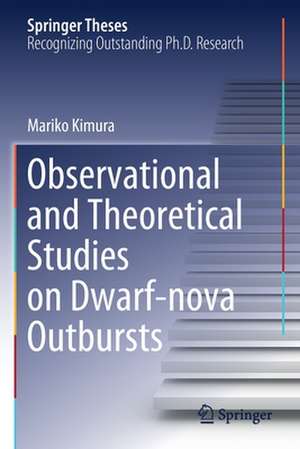Observational and Theoretical Studies on Dwarf-nova Outbursts: Springer Theses
Autor Mariko Kimuraen Limba Engleză Paperback – 29 oct 2021
| Toate formatele și edițiile | Preț | Express |
|---|---|---|
| Paperback (1) | 636.30 lei 6-8 săpt. | |
| Springer Nature Singapore – 29 oct 2021 | 636.30 lei 6-8 săpt. | |
| Hardback (1) | 642.51 lei 6-8 săpt. | |
| Springer Nature Singapore – 29 oct 2020 | 642.51 lei 6-8 săpt. |
Din seria Springer Theses
- 18%
 Preț: 997.88 lei
Preț: 997.88 lei -
 Preț: 389.88 lei
Preț: 389.88 lei - 15%
 Preț: 646.94 lei
Preț: 646.94 lei - 18%
 Preț: 943.43 lei
Preț: 943.43 lei -
 Preț: 399.29 lei
Preț: 399.29 lei - 18%
 Preț: 944.99 lei
Preț: 944.99 lei - 15%
 Preț: 636.80 lei
Preț: 636.80 lei - 18%
 Preț: 941.05 lei
Preț: 941.05 lei - 15%
 Preț: 643.16 lei
Preț: 643.16 lei - 15%
 Preț: 642.68 lei
Preț: 642.68 lei - 18%
 Preț: 1103.62 lei
Preț: 1103.62 lei - 20%
 Preț: 558.82 lei
Preț: 558.82 lei - 18%
 Preț: 1112.30 lei
Preț: 1112.30 lei - 18%
 Preț: 944.19 lei
Preț: 944.19 lei - 18%
 Preț: 1109.92 lei
Preț: 1109.92 lei - 18%
 Preț: 1217.27 lei
Preț: 1217.27 lei - 15%
 Preț: 640.06 lei
Preț: 640.06 lei - 15%
 Preț: 636.45 lei
Preț: 636.45 lei - 15%
 Preț: 640.06 lei
Preț: 640.06 lei - 15%
 Preț: 640.88 lei
Preț: 640.88 lei -
 Preț: 389.70 lei
Preț: 389.70 lei - 20%
 Preț: 563.89 lei
Preț: 563.89 lei -
 Preț: 393.35 lei
Preț: 393.35 lei - 15%
 Preț: 637.93 lei
Preț: 637.93 lei - 15%
 Preț: 641.85 lei
Preț: 641.85 lei - 18%
 Preț: 1225.94 lei
Preț: 1225.94 lei - 20%
 Preț: 551.36 lei
Preț: 551.36 lei - 18%
 Preț: 1229.10 lei
Preț: 1229.10 lei - 15%
 Preț: 639.25 lei
Preț: 639.25 lei - 18%
 Preț: 999.45 lei
Preț: 999.45 lei - 15%
 Preț: 640.06 lei
Preț: 640.06 lei - 18%
 Preț: 1220.45 lei
Preț: 1220.45 lei - 18%
 Preț: 1116.26 lei
Preț: 1116.26 lei - 18%
 Preț: 1110.72 lei
Preț: 1110.72 lei - 18%
 Preț: 1000.87 lei
Preț: 1000.87 lei - 18%
 Preț: 891.17 lei
Preț: 891.17 lei - 15%
 Preț: 640.06 lei
Preț: 640.06 lei - 5%
 Preț: 1154.07 lei
Preț: 1154.07 lei - 15%
 Preț: 635.96 lei
Preț: 635.96 lei - 15%
 Preț: 640.88 lei
Preț: 640.88 lei -
 Preț: 387.20 lei
Preț: 387.20 lei - 18%
 Preț: 1109.92 lei
Preț: 1109.92 lei -
 Preț: 385.25 lei
Preț: 385.25 lei -
 Preț: 385.25 lei
Preț: 385.25 lei - 18%
 Preț: 1112.30 lei
Preț: 1112.30 lei - 18%
 Preț: 999.45 lei
Preț: 999.45 lei -
 Preț: 386.99 lei
Preț: 386.99 lei - 15%
 Preț: 637.13 lei
Preț: 637.13 lei - 20%
 Preț: 554.20 lei
Preț: 554.20 lei - 20%
 Preț: 555.57 lei
Preț: 555.57 lei
Preț: 636.30 lei
Preț vechi: 748.59 lei
-15% Nou
Puncte Express: 954
Preț estimativ în valută:
121.77€ • 125.80$ • 101.34£
121.77€ • 125.80$ • 101.34£
Carte tipărită la comandă
Livrare economică 25 martie-08 aprilie
Preluare comenzi: 021 569.72.76
Specificații
ISBN-13: 9789811589140
ISBN-10: 9811589143
Ilustrații: XXX, 179 p. 80 illus., 50 illus. in color.
Dimensiuni: 155 x 235 mm
Greutate: 0.3 kg
Ediția:1st ed. 2020
Editura: Springer Nature Singapore
Colecția Springer
Seria Springer Theses
Locul publicării:Singapore, Singapore
ISBN-10: 9811589143
Ilustrații: XXX, 179 p. 80 illus., 50 illus. in color.
Dimensiuni: 155 x 235 mm
Greutate: 0.3 kg
Ediția:1st ed. 2020
Editura: Springer Nature Singapore
Colecția Springer
Seria Springer Theses
Locul publicării:Singapore, Singapore
Cuprins
General introduction.- Unexpected Superoutburst and Rebrightening of AL Comae Berenices
in 2015.- Outburst Properties of Possible Candidates for Period Bouncers.- On the Nature of Long-Period DNe with Rare and Low-Amplitude Outbursts.- Thermal-viscous Instability in Tilted Accretion Disks: A Possible Application to IW And-type Dwarf Novae.- General Discussion.- Conclusions.- Appendix.
Notă biografică
Mariko Kimura graduated from the Faculty of Science, Kyoto University in 2015, and entered the university’s Graduate School of Science in the same year. She was awarded a research fellowship by the Japan Society for the Promotion of Science (JSPS) in 2017, and was supported by JSPS throughout her doctoral studies. During this time, she also studied briefly overseas at Durham University, UK (six months) and Caltech, USA (10 weeks). She completed her Doctor of Science in March 2020 and has just begun her postdoctoral career at RIKEN, Japan.
Textul de pe ultima copertă
Accretion disks are ubiquitous in our universe, and produce intense brightening. How does the gas in the disk lose its angular momentum to release massive amounts of gravitational energy? This is one of the biggest open questions in astronomy. This book studies four types of newly detected outbursts in dwarf novae through optical observations and/or numerical simulations and puts forward physical interpretations of these outbursts on the basis of the disk instability model, the most plausible model for dwarf-nova outbursts. It demonstrates that the disk-instability model can explain rich variety in dwarf-nova outbursts if some new aspects are taken into account (e.g. the extremely slow growth of tidal instability and thermal instability in the disk misaligned against the binary orbital plane). Moreover, it shares valuable insights on the evolution of binary systems by finding period bouncers and dwarf novae with F-type companion stars, which are rare objects.
Caracteristici
Nominated as an outstanding Ph.D. thesis by Kyoto University, Japan Explores the physical mechanisms of new types of outbursts in dwarf novae through optical observations and numerical simulations Introduces new aspects to the disk-instability model, like the extremely slow growth of tidal instability and thermal instability in the tilted disk Shares valuable insights on the evolution of binary systems composed of low-mass stars
